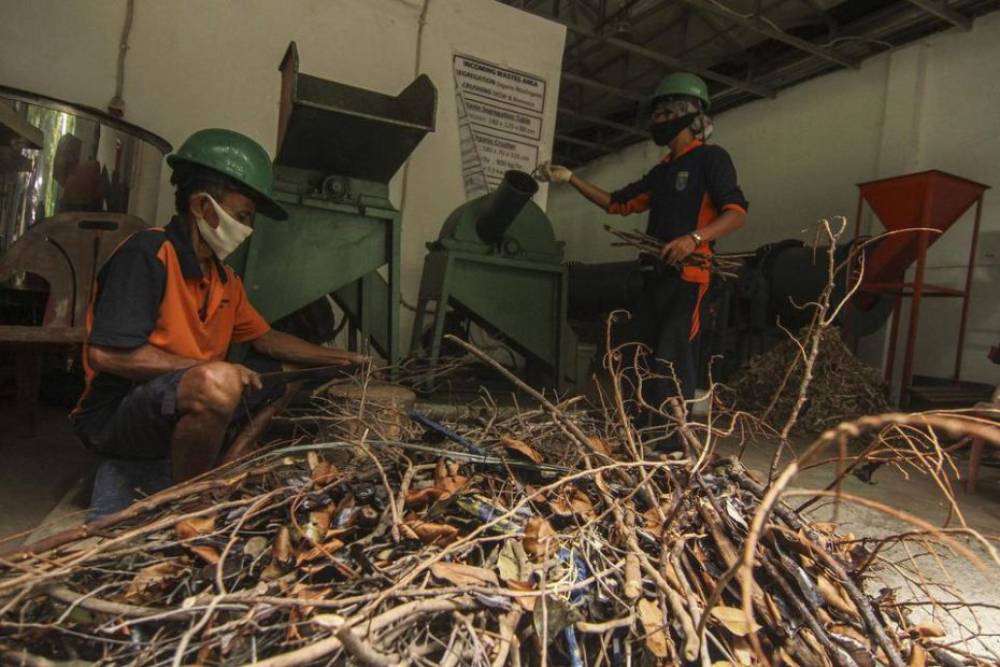
Biomass Producers Reject PLN's DMO Proposal, Potential Investment Hamper.
Biomass producers consider the domestic market obligation (DMO) scheme for coal mixtures or co-firing of PLN's steam power plants (PLTU) is not urgent.
The Indonesian Biomass Energy Society or MEBI explained that the cost of raw materials and production costs for several types of biomass in Indonesia are higher than PLN's Highest Reference Price (HPT). The reference price is in the range of US$ 51 per ton for coal-equivalent biomass with a calorific value of 4,300 - 4,600 kcal per kilogram.
MEBI Chairman Milton Pakpahan said that the implementation of DMO has the potential to hamper the development of the domestic biomass industry because it creates sentiment and risk of investment uncertainty.
"This is risky considering that the cost of raw materials and production costs for several types of biomass in Indonesia are higher than HPT," Milton said via text message on Tuesday (23/5).
PLN proposed DMO for the procurement of PLTU biomass starting from the company's concerns about experiencing a deficit in biomass raw materials. The deficit is caused by the majority of domestic producers prefer to sell their products to the export market which offers higher prices.
The mechanism for determining the DMO for co-firing PLTU imitates the provisions applied in the procurement of coal for PLN PLTU and industry. Through the instrument of the Minister of Energy and Mineral Resources Decree Number 139 of 2021, the government requires domestic coal business actors to meet the domestic sales quota of 25% of annual production for general electricity and industry.
Milton said the proposal related to the DMO for biomass products to meet the needs of PLN's PLTU of 10.2 million tons in 2025 is still not relevant to the current condition of the domestic biomass industry.
"In our opinion, it is currently not on target and timely because the biomass industry in general in Indonesia is currently classified as an industry that is still developing and not yet mature when compared to the coal industry," said Milton.
The Central Statistics Agency (BPS) recorded 4.6 million tons of palm kernel shells exported throughout 2022 with main destinations such as Japan, Thailand and South Korea. Palm Kernel Shell is a biomass commodity that has a calorific value equivalent to coal ranging from 4,000 - 4,800 kcal per kg. In addition to palm kernel shells, other commodities that can be used as a co-firing mixture are wood pellets.
MEBI noted that Indonesia's palm kernel shell production potential is estimated to reach 10 million tons in 2023. Of that amount, the export portion is around 46% while 54% or 5.4 million tons have been absorbed domestically, both for internal use of palm oil mills and by other industries.
Milton assessed that the implementation of DMO for PKS commodities was not yet appropriate because it would not play a significant role in meeting PLN's biomass needs, especially because the power plant is located on the island of Java which uses a Pulverized Coal boiler type that is not suitable for using palm kernel shell biomass.
"The government must of course be able to see the potential impact of this DMO comprehensively, starting from the loss of potential state foreign exchange earnings from export activities to taxes and technology transfer from foreign investment," said Milton.
To meet PLN's biomass needs of 10.2 million tons in 2025, the development and realization of investment in the Energy Plantation Forest (HTE) sector with end products in the form of sawdust and wood chips is something that needs to be prioritized compared to the implementation of DMO.
Previously, PT PLN requested a special regulation in the form of imposing a domestic sales obligation (DMO) for the distribution of biomass as a mixture or co-firing of PLN's PLTU.
PLN Energi Primer Indonesia (EPI) Corporate Secretary Mamit Setiawan explained that currently biomass for power plants is limited by the highest benchmark price or HPT. Currently, the HPT for coal for PLN is US$ 70 per ton with a calorific value of 6,300 kcal per kilogram (kg).
This figure can change slightly along with the level of biomass calorie content which is equated with the calorific content of coal. Meanwhile, the upper limit for the price of low-calorie coal of 4,300 to 4,600 kcal per kilogram is set at US$ 51 per ton.